The love and loss driving Coach K’s final season
Mike Krzyzewski walked into his office last summer in a melancholy mood. His yellow lab, Blue, had died in his arms the month before. Approaching the start of his final season, he teared up as he told stories about Blue. The family has always had communal dogs, named Cameron and Defense, but Blue belonged to him, and would sit at his feet while he watched hours of game film. Coach K loved his dog and on this afternoon felt his absence acutely. There were a lot of feelings in the air. He had moved into the inevitable wilderness of loss and goodbyes, approaching his 75th birthday and the end of his life’s work, which is not the natural habitat for a guy like him. He once wrote in an elementary school essay that he either wanted to become an accountant or a priest. Those urges still remain. He is forever keeping score.
“I try not to look in the future,” he says, “and I definitely don’t look in the past.”
Krzyzewski’s office is in the top of the tower Duke built in 1999 after he’d won two of his five national championships as its head basketball coach. He is on the sixth floor, and all the other coaches are a level below. Coach only needs to take a right out of his office, then another right down a back stairwell, to get to his assistants. For the past 42 seasons he’s called the Duke campus home, bringing his wife and family into the operation — his daughter Debbie Savarino keeps an office down the hall from his — and that is all coming to an end. He’s lived a life that would have seemed impossible to his parents in their working-class Polish neighborhood in Chicago. Not long ago, he flew back to his hometown in a private jet, and his best friend from childhood, Dennis “Moe” Mlynski, picked him up in his wife’s minivan. The big jet landed as Moe watched from inside the private terminal. The pilot parked a few yards from the door and still a golf cart came to pick up Krzyzewski. Coach saw Moe gearing up to demolish him for being soft and rich as he took his first steps inside.
“Moe, don’t say a word,” he said.
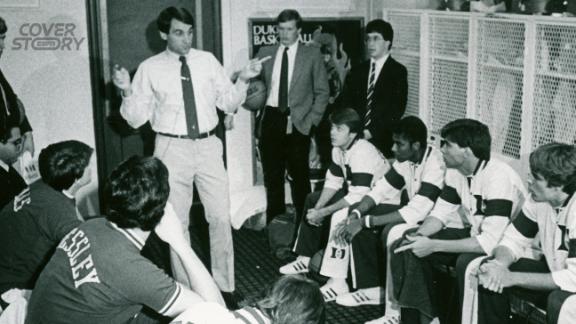
The final March of Coach K
Few coaches in any sport have matched the enduring success of Mike Krzyzewski. In his final season, the 75-year-old coach is hoping one last run can bring his journey full circle. Produced by Frank Saraceno; Edited by Lamarr English and Amanda Winkler
Right now, as Coach K sits in his office and tries to dodge questions about nostalgia and imminent farewells, Moe arrives in Durham, North Carolina, to hang out for a few days. They’re still best friends. Krzyzewski remains deeply connected with the world he knew as a child and no matter what he tells himself, or tells visitors to his sixth-floor castle keep, he has been most definitely looking into the past in recent days. Maybe it’s more accurate to say that the past has been reaching out to him, demanding his attention.
It started last month when he found himself talking to butterflies.
There’s nobody in his life who meant more to him than his mother, Emily Krzyzewski. She died in 1996 at age 84. When he’d go recruit in Chicago, instead of staying at some fancy hotel, he’d always crash in his mom’s small three-room flat. She never moved, not even when her son got rich. They talked after every game.
“He can still repeat her number,” Debbie says.
“1-312-276-8681,” he says.
When their mother died, Mike’s brother, Bill, sent him a box of possessions they’d found in her apartment. Mike started sifting through the things his mother had left behind. Finally he flipped open a worn steno pad to find thousands of notations, page after page, each line listing a date, an opponent and either a W or an L. He cried, realizing that, without him knowing, she had tracked every game he’d ever coached.
His former player and assistant, Steve Wojciechowski, says that during incredibly tense moments, big games when the noise came down from the bleachers like tumbling boulders, his boss would softly say a prayer to his mother. Coach K believes that his mother still watches over him, sometimes taking the form of butterflies. She loved them. His wife, Mickie Krzyzewski, planted bushes in their backyard that attract them. So around the time he announced his plans to retire from the game that had defined his life, a butterfly landed on his car. He stood and watched, and the thing refused to move. It just sat there, and so he waited too. Finally he needed to go. He leaned toward the butterfly.
“All right, Mom,” he said, and it — she — finally flew away.
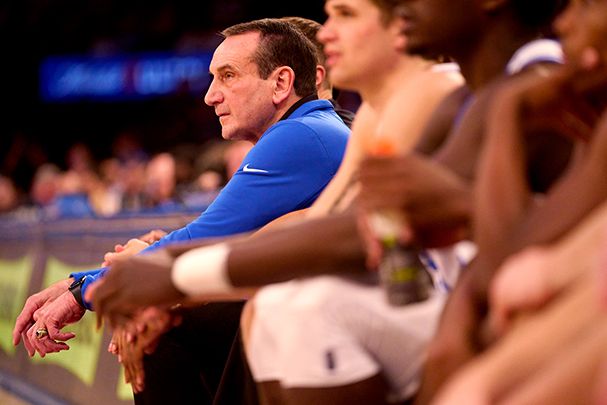
Mike Krzyzewski paid no mind to nostalgia at the start of the season, when his final Duke team opened against Kentucky at Madison Square Garden. “I try not to look in the future,” he says, “and I definitely don’t look in the past.”
Erick W. Rasco/Sports Illustrated/Getty Images
WHEN THIS LAST season began, I met Krzyzewski in a hallway somewhere in the bowels of Madison Square Garden in New York, a few minutes after his Blue Devils had won their first game, against a talented Kentucky team. The Garden had prime-time energy. Bruce Springsteen sat at center court. Duke’s star freshman, Paolo Banchero, led the team and closed out a fierce opponent; a baptism, and his coach now smiled with pride.
“His first big game,” Krzyzewski says, looking almost giddy. “I feel closer to this team than I have in the last decade, and I’ve been pretty close with teams.”
He sees a familiar face waiting for him.
“Moe!” he yells with a huge smile.
The two old friends embrace. Coach K and Mickie invite Moe and his son to sit with them in the small office. Mickie, their children and grandchildren often hang around the team, working the doors at camps, babysitting for assistant coaches. It feels like one big, weird family up close, and all that is in its final year, too. “We are not going to be the first family of Duke basketball anymore,” says Debbie Savarino, an assistant director of athletics who is still known to everyone as Debbie K. “What does that look like? What does that feel like?”
One of her sons, Michael, is actually on the team. The other nine grandchildren call Krzyzewski “Poppy,” but Michael calls him “Coach.” Inside the office, Krzyzewski talks about how important this win was, for this season, for his team, for himself. Few things in the world feel better than 1-0. Heavy bass rattles the locker room speakers as the team packs for the flight home and people gather and talk and laugh in the hall. Chatter filters out from a police radio. This is the sound of victory. The managers load blue duffel bags onto the Garden’s famous freight elevator and shuttle them down to the loading dock. There’s something beautiful about the efficiency and rhythm of these postgame hours, practiced, learned, internal, more like blood flowing in a vein than a schedule prepared and kept. A postgame arena, still buzzing, is a temple, a place where dreams live. Coach K is a creature of this underworld, and soon both these private spaces and his mastery of them will slip through his fingers.
“It’s gonna be so weird next year …” one of the managers says to another.
It’s nearly 1 in the morning when Krzyzewski comes out of this office with both his wife and his best friend. We all take a left and step into the big freight elevator on the fifth floor of the Garden. A lot of big-time coaches love to reminisce about this elevator, which has the patina of history and a kind of gladiatorial spirit. This is Coach K’s last ride on it.
On the way down, he and Moe talk about Father Francis Rog. He taught Mike geometry at Archbishop Weber High in Chicago and, for the past six decades, has served as his spiritual adviser. The father’s been in the hospital, and everyone in their circle of friends is worried.
“He’s one of THE great men,” Krzyzewski says as the freight elevator doors close.
They’re in a good mood — you don’t want to be near Krzyzewski after a loss, even now, after all the supposed perspective added by time and more than a thousand career victories — and he and Moe and Mickie are enjoying tonight, telling stories about Father Rog.
“You know,” Coach K continues, “he changed my life. He explained religion the right way.”
They laugh hard as Krzyzewski plays the part of a tough old priest: What you did was a sin, what you are is a sin and what you will be is a sin. Basically, life is full of guilt and then we die.
“That is it,” Coach K says with a grin. “Call it a day. I’ll go to heaven less guilty.”
He laughs.
“Maybe.”
The elevator lets them off on the third floor, and Krzyzewski leads the way through the hidden parts of Madison Square Garden, a walk he’s made so many times before. He and his team made this walk 10 years ago when he passed his mentor, Bob Knight, for the most wins in college basketball history. We round a corner and come down the loading dock toward Eighth Avenue. The cityscape of honking cabs and cheering Duke fans awaits. Coach and Moe say goodbye, and the Krzyzewskis climb aboard one of the team buses bound for the airport and, around 3 or 4 in the morning, home.
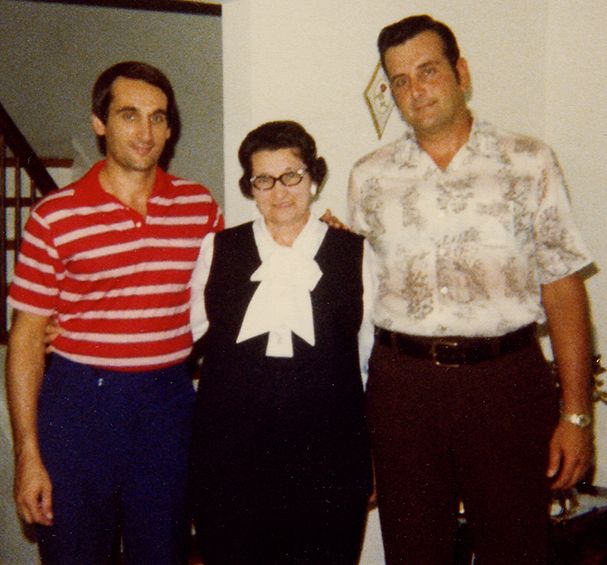
Whether in the form of a butterfly or a coffee ordered “Boston,” Mike Krzyzewski’s parents, Emily and Bill, have been by his side during his final season as Coach K. Courtesy of Duke
MOE PICKED ME UP at my Michigan Avenue hotel in Chicago, which happened to be in a building Mike’s mother used to clean at night when she worked as a janitor. We drove over to the old neighborhood, back in time. For Moe and all their shared old Polish friends, who called themselves the Columbos after the name of their elementary school, Coach K’s retirement comes as they are entering the last acts of their lives. Two recently died. Another lost his wife and can’t be around the Columbos these days without crying.
“I’m gonna retire the day after he retires,” says Larry Kusch, who goes by Mondo. “I will beat him!”
Moe takes me on the tour. He talked to Coach last night to find out what he wanted me to see. First we stop on Cortez Street, at the apartment where Mike grew up, surrounded by his first cousins. There were 17 of them in all, Coach the youngest, and only four are still alive.
“All the elders are gone,” cousin Miriam Kross says.
Their parents wanted for them a respectable American life, and Krzyzewski’s military education and officer’s commission got him that. His parents pushed him hard to go to West Point. Krzyzewski remembers them sitting around the dining table talking feverishly in Polish, punctuated by the occasional “Mike” and “stupid” and the like. They couldn’t believe their son would turn down a free education at a school that produced officers and even presidents. Finally he got the message and accepted the appointment. Moe says that a lot of his friend Mike’s success in life flows from a desire to honor them. But that’s just part of it. Mike inherited his father’s ambition and paired that with his own need to shape those ambitions into a new, better life. From the beginning, Krzyzewski burned inside and still doesn’t totally understand the origins of that fire. An alien, he calls himself. His friends all followed their parents’ path and built those respectable lives while erasing any thoughts of personal fulfillment or passion (“It’s a sore point with me,” says Eddie Stanislawski, one of the Columbos, “I told my kids to follow their bliss.”) but Krzyzewski decided to listen to the person inside him who wanted to coach. His ambition made him let go of a brass ring to reach for a gold one. Moe remembers exactly where he was standing when Mike told him he was going to quit the Army. After lunch, at a hot dog place where Coach K loves the Italian beef, he drives me to the spot.
Emily Krzyzewski’s apartment remains in the family. Cousin Craig lives there now. He opens the door for us and takes us up the back steps. Krzyzewski’s mom and aunt lived next door to each other and shared a landing for three decades. Often they’d sit out there in their chairs, hour after hour, and laugh and tell stories. This is where Coach K came to stay during all those recruiting trips. When he woke up, his mother would have ironed his clothes.
Moe points to the spot where her West Point rocking chair used to be, and the yellow plush recliner where she’d sit and watch the games with her steno pad at the ready. There was linoleum on the floor and a faux oyster dining table. She kept a Duke calendar on the fridge, and former Duke player and assistant coach Tommy Amaker talks about how moved he was to go inside with Mike once and see his own image hanging there. We take a left in the hall to the room she used for meals. Moe still calls Coach K “Mick,” which is how the neighborhood kids knew him.
“Mick, Mickie, my wife and I were in this room,” Moe says, “and he said, ‘I think I’m gonna give up my military commission and go into coaching.’ We were sitting in here, the four of us.”
There’s a feeling in the room, and not because the journey to five national championships started here, but because it was here that a guy like any of us felt a pull and listened to it, trusting himself with no way of knowing how it would turn out. Trace amounts of that energy remain, the half-life remnants of a young, ambitious man turning his back on the respectable American life his father wanted for him and stepping out into the world alone.
Moe points.
“In this room,” he says.
Back outside, Moe explains that this neighborhood, now a trendy place called Ukrainian Village, was known then as St. Helen. Every neighborhood in the city was known by the name of the local parish. That’s not how it is now. A map of Chicago, once as accepted and formal as the printed maps of the L trains you can pick up beneath the rumbling tracks, exists only in the memories of people Krzyzewski’s age. The world that shaped them is vanishing as fast as its fragile citizens. This year, then, is a gift for all of them, in the way that it demands you stop and take stock — to consider how they were all made. They grew up in a parochial world governed by unspoken but strict laws. All of them have stories. Once Moe and a friend were walking near home and came upon a real-life, in-progress medieval Ukrainian parish schism. A small majority voted to abandon the old world calendar and align their feast days with the Roman Catholic Church. The other parishioners were filled with rage. They formed a mob outside the rectory and dragged the priest from his home, still in his cassock, and beat him there on the lawn, Moe remembers. The crowd then organized, raised money and built another enormous cathedral a few blocks away. They once saw an unleashed pack of police dogs on Damen Avenue. Mike’s own brother, a tough Chicago fireman who literally never missed a day of work, refused to drink with anyone who crossed the picket lines in 1980.
Coach K’s basic understanding of loyalty is rooted in the ancient rules of the blocks around his boyhood home on Cortez. Take Mike’s old high school. The diocese sold the building to the city, and now it houses a public middle school. The old chapel is now an office. They have cleaned it and painted the walls, coat after coat, but no matter what they do they can never get rid of the smell of incense. Something essential comes through, leaves a mark. There’s a video online of Coach K screaming at his own Duke student section for what he mistakenly thought was a chant about one of his old assistants, Jeff Capel, who’d returned to Cameron Indoor Stadium as the head coach of Pitt. Read his lips. As he points to his chest, what he is saying over and over is, “He’s one of us!”
WE RODE UP and down the old Polish streets.
Coach K might be the most famous living Polish American, but his grandfather on his dad’s side wasn’t actually from Poland. John Krzyzewski (whose last name is spelled Krzyzowski in some documents) was ethnically Polish, certainly, but he moved to the United States from a small autonomous region named Galicia, which was part of the Austro-Hungarian Empire and ceased to exist in 1918, swallowed after the war by Poland. Mike’s grandfather was living in Chicago when that happened. He died in his 40s, just a year later. Coach K, who built his own world out of a bouncing leather ball, comes from people who lost their old homeland before they fully grasped a new one.
His father was born William Krzyzewski. He changed his last name to Kross.
“I didn’t know him that well,” Moe says. “He was …”
There’s a long pause.
“I didn’t know him that well,” Moe says again.
Bill Kross ran an elevator in the Willoughby Tower downtown. He bought a bar called Kross Tap that Mike used to clean on Sundays. A lot of Chicago cops hung out there. “He had a tavern, but he very seldom ever took a drink,” says LeRoy Lipske, who was married to Krzyzewski’s cousin and tended bar for his dad. “He had coffee from morning to night.”
They all remember that. Nonstop coffee, always with lots of cream, a cup he called “Boston”: I need a coffee, Boston, please, an old-timey order that nobody says anymore.
Bill was a dreamer, his family says, but nothing he tried really worked. His bar didn’t make money, and his restaurant didn’t either. “Mick and I talked about it,” Moe says. “His dad always wanted to be somebody. Life didn’t always give him the opportunities.”
Krzyzewski grew up with a silent, hardworking father grasping for something he could never quite hold, and a buoyant, wise mother, who gave him little pep talks and sayings that he still gives to his teams, all these years later. Every Duke basketball player has heard the story about how muggers tried to take her purse when she was an old woman and she fought them off. The Emily K Center in Durham, which mentors local kids from elementary school through college, is his pride and joy, because it carries her name, yes, but also because it continues to live out her spirit.
His parents spoke Polish to each other but demanded the boys never learn it. They didn’t want them to carry the baggage of an accent. Krzyzewski grew up with a strange last name that his own father didn’t use. Moe has been thinking about this a lot lately because going through his own father’s things he found some old letters in which his dad had used the last name Miller. Moe felt sad, emotional, wondering what else his father kept inside, what pain and longing. The same is true for Coach K. Some of the family kept Krzyzewski, while others went by Kross. One of his uncles was militant about the original Polish spelling and would gruffly quiz his nieces and nephews whenever they walked through the door. Coach K clearly remembers being young, 5 or 6, and nervously trying to get everything straight with his mother as they walked up the steps to visit Uncle Joe.
“Mom, what’s my name?” he’d ask.
Bill Kross died young during his son’s senior year at West Point. Bob Knight came to the small family home, sitting across a table from LeRoy the bartender (who himself died Jan. 7, 2022). In those days of grief, Knight became arguably the most important male figure in young Mike’s life, now that his father was gone. The family buried this silent man beneath a tombstone with his changed last name. Here lies William Kross, who never saw his son coach a single game.
“He was such a big sports guy,” Krzyzewski says as we sit in his sixth-floor office one day, with huge windows overlooking Duke’s gothic campus.
“He … ”
He gets lost for a moment.
“He would be in la-la land,” he says finally.
He’s quiet again.
“My dad would have been walking the lobby,” he says. “‘That’s my son out there. I know you didn’t ask …'”
I ask him what name his dad would use to check into the Duke team hotel.
Coach K laughs and smiles.
“It wouldn’t be Kross,” he says.
Decades passed as he adjusted to the absence of his father. Krzyzewski told me one afternoon that he wished his father could have seen this life he’d built. Emily K grew old and died, too, and only then did Mike and his brother quietly have their dad’s old tombstone dug up and thrown away, replaced with one that said “Krzyzewski.”
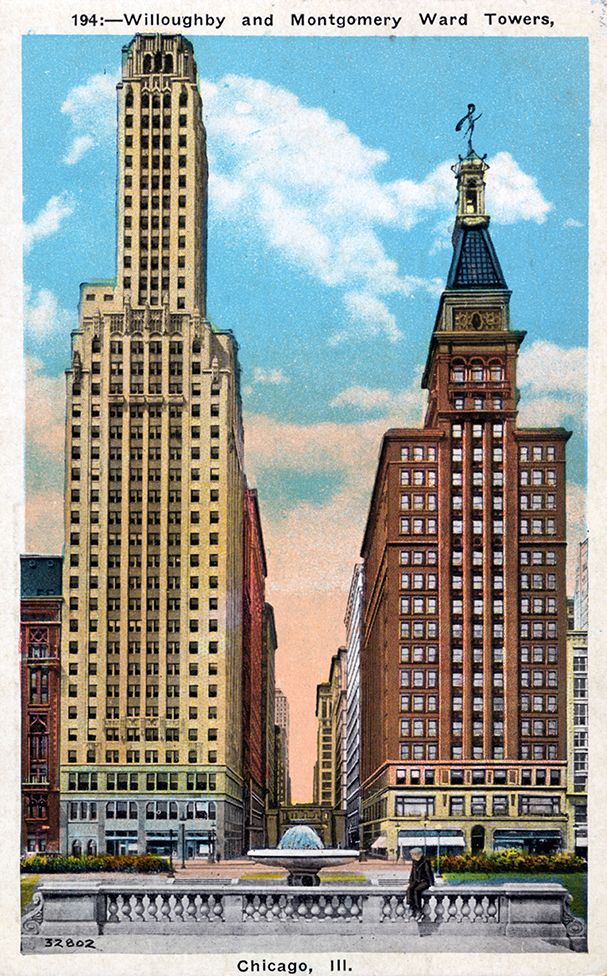
In addition to owning a bar, Bill Kross also was an elevator operator at Willoughby Tower on Michigan Avenue. Curt Teich Postcard/Heritage Images/Alamy
EIGHT HUNDRED MILES AWAY from the gravestone, Coach K sat in his office, and he wanted to tell me a story. Before the pandemic, he was in Chicago to give a speech. He’s been doing that for years, and he likes the extra money but mostly likes the chance to learn and meet people outside his bubble of fame. As he usually does, he made plans with Moe to eat at one of the classic Italian joints on Rush Street. The idea was for Moe to pick him up at the hotel, but the traffic got so bad, Moe called and said they should just meet at the restaurant. Coach K decided to walk. He hadn’t strolled the streets of Chicago in a long time. As he headed down Michigan Avenue, he looked up to see Willoughby Tower, where his father once ran the elevator.
Krzyzewski walked inside. The security guard recognized him.
“My dad used to work here,” he explained and then asked if he could go see the elevators. The guard nodded, and Coach K went over alone and just stood there. He knows how it sounds, but he felt his dad’s presence. The next morning he got to his speech early, to listen to the person going before him. A crowd of 600 people faced the front of the room while Krzyzewski snuck into the back, finding a table with a continental breakfast and rolls. Coach K poured himself a coffee and loaded in the cream.
One of the hotel staff looked at him.
“So you like your coffee Boston?”
Krzyzewski wheeled around.
“I get chills thinking about it,” he says. “Son of a bitch, is he saying hello through this guy?”
He asked the man to repeat himself.
“Boston,” the waiter said, “like you put a lot of cream in it.”
Krzyzewski smiled.
“I do like it Boston,” he said.
After all these years, he feels like his dad had reached out to let him know he’d done good. That he’d seen what his son had done with their strange last name and was proud. At the end of his career, the universe was speaking to him, or maybe he was just at peace enough to finally and truly listen. Either way, he felt grateful.
I think for a moment he might cry. He laughs instead.
“Motherf—er,” he says. “It’s unbelievable.”
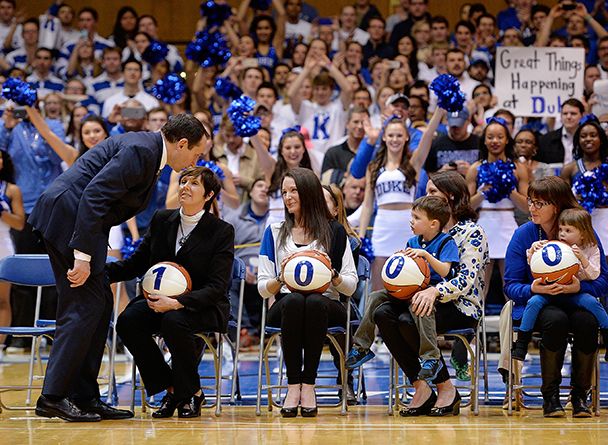
The Krzyzewski family — Mickie, the kids, the grandkids — have been intertwined with Duke basketball since Mike Krzyzewski was introduced as coach on March 18, 1980. Grant Halverson/Getty Images
MOE AND I spent a lot of time together and one afternoon in Chicago, he took me to a hospital on the outskirts of the city for one last stop. Coach wanted me to meet Father Rog. We parked and went inside.
The hospital allows only one visitor at a time, so Moe sneaks me past the guard and onto the elevator. We find the father in bed, wearing a yellow hospital gown, with an amputation scheduled for part of his foot in 30 minutes. He taught Mike in high school and helped him square his faith with his ambition, and later performed the funeral for Mike’s mother and his beloved brother. Coach K’s daughter thinks what Father Rog gave him most of all was “permission.”
“Permission to practice his faith in the way that he does,” Debbie K says. “Permission to be who you are, and it’s OK to be this intense person who swears on the sidelines.”
The old priest turns his television volume down and extends his hand.
“I’m Father Francis Rog,” he says.
On his wrist is a 2015 Duke national championship watch. He smiles when I notice it. He’s got piercing blue eyes. His thick glasses, familiar to generations of students, rest on his nightstand.
“I’m sorry I’m in this condition,” he says.
He’s 91 years old but sharp and funny. He tells stories about Krzyzewski in high school, calling him wholesome, and he recounts how they’ve kept in touch. Their conversations are private, between a man, his confessor and God. “I’m very important in his life,” he says, “and as a result, he’s very important in my life.”
There’s a question that has been running through my head since I heard that Krzyzewski has a spiritual adviser: Why the hell does he have a spiritual adviser? He seems so buttoned up.
I asked everyone what he’s struggled with most in his life. His former coaches gave mostly basketball answers, most of them about the personal price of his demand for perfection, and how to balance his better angels with the masochistic version of himself who was taught early on by his mentor that anger was not only an acceptable byproduct of the process but perhaps an essential part of it.
But his daughter Debbie had the best answer to the question. Her dad carries a lot of invisible burdens, wanting desperately to be all things for all people. “I think the thing he’s struggled with most in his life is forgiveness of himself,” she says.
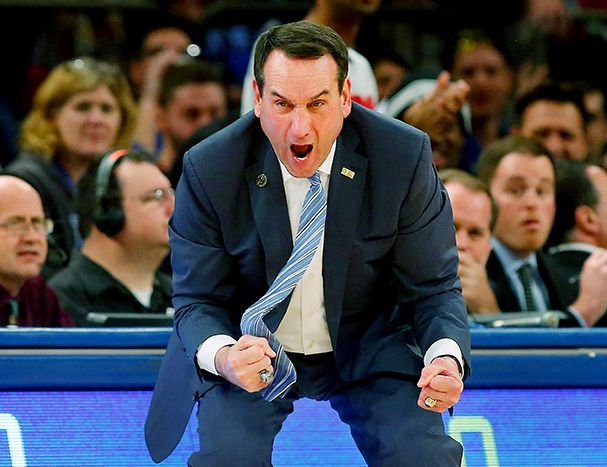
Coach K — to one degree or another — has sometimes struggled to control the fire that burns within him. “He is wired to eat his young,” Mike Brey says.
Jim McIsaac/Getty Images
KRZYZEWSKI’S BEST IMPULSES are so well known that his worst impulses can seem somehow twice as shocking when seen up close. He can be petty and overly sensitive. One of his former players, when asked to talk about Krzyzewski’s retirement, carefully parsed his words: “It’s not even what I would say. It’s just knowing him and how he could potentially interpret something I would say.”
He has screamed at student reporters covering his team. Even now he struggles to apologize when he knows he’s wrong. Like his college coach and first boss, Bob Knight, he’s thrown chairs. He’s broken clipboards. During a timeout, he once looked at his team in the huddle and told them, “Your f—ing faces suck.” He has made young men cry under a verbal barrage. A favorite tactic is to kick the team out of the locker room and throw all their stuff into a pile on the floor. He is never not the man who was a captain in the United States Army. Natural cycles of overconfidence and failures of focus that can happen over the course of a Duke season tend to fill him with rage.
“He gets pissed at human nature,” says Jon Scheyer, who will be the team’s head coach next season.
The way his team plays is so wound together with the way he sees himself, in the opinion of one of his former assistants, that a string of losses can feel less like a professional failure and more like a personal one. Especially before his friend Jim Valvano told him on his deathbed not to miss out on his real life just to win games, Krzyzewski was capable of putting basketball above the other relationships in his life. One year, former assistant Mike Brey said they were preparing for a game at Madison Square Garden when Mickie came barreling into a meeting and dragged him away just to sing “Happy Birthday” to his daughter Lindy. Mickie has long been the officer in charge of Krzyzewski’s better angels. There are many ways in which she has shaped Duke basketball but none more significant than that.
When assistants have left Duke, he can take it personally, both excited for them and yet wounded, because any defection is a potential crack in this complex work family he’s built on a foundation of almost archaic loyalty. It’s complicated up close. He is at his core a foxhole guy but is also always the architect and gatekeeper of the foxhole. A former assistant who coached against him put it this way: “I don’t think he can allow himself to see you as a human being. I think that goes back to Knight.”
“He is wired to eat his young,” Brey says.
The most recent example came when ex-Duke guard Grayson Allen became public enemy No. 1 for his continued tripping. Krzyzewski and his family fixated on former Duke star and assistant coach Jay Bilas, now the voice of college basketball for ESPN, and blamed him for anything said on the network, whether or not he had anything to do with it. Once when Bilas came to do a game in Durham, he walked onto the court at Cameron and Krzyzewski literally turned his back on him. Bilas always saw Krzyzewski as a father figure. Dozens of Formers, as the ex-Duke players are known inside the program, thought the same thing about Coach K, so this rift shook a lot of people.
Bilas and Krzyzewski finally scheduled a meeting and aired out their issues and emerged with clean slates, a blip on a 40-year radar of warm feelings, and everyone in the insular family of Duke basketball could exhale. But for a brief moment, some of the people closest to Krzyzewski had to ask themselves how well they really knew him after all.
NOVEMBER UNFOLDED IN a dream.
Duke went out to Las Vegas at the end of the month and beat Gonzaga. Coach K saw hints of greatness, as a young team arrived in a big game, in a big venue, and instead of being scared of the stage, it grew to fit and claim it. This flickering vision of what these Blue Devils might be, were capable of becoming, flashed bright and then would fade through the teeth of winter.
Coach K told his players his own hoops doxology: Every season is a lifetime.
“You get one shot at this,” he told his team.
Out in Vegas, Mike and Mickie saw their friend Elaine Wynn, the casino baron. They’ve known her since Duke beat her beloved UNLV in 1991 and she loved how respectful he was after the game, refusing to buy into the narrative that this was a battle of good versus bad. She’s been a great friend and a regular visitor to Cameron. Elaine loves how basketball for the Krzyzewskis is a family sport. She tells stories about going to games in Durham and seeing the three daughters lugging babies and diaper bags and bottles into the tight confines of the arena’s old wooden bleachers and wondered why in the world anyone would go to all this trouble to watch their dad and granddad work. Of course she gets it. “When you have a man that is so invested in a passion,” she says, “you either get on the train or you’re completely off the train and you won’t have a lot.”
Along with her ex-husband, Steve Wynn, she created some of the great Las Vegas properties, including the Bellagio. Once she ate there with the Krzyzewskis, after she no longer owned it, and little mistakes bothered her. She told Coach K that it took her a long time to understand it wasn’t her casino any longer. Then she smiled and said one day he’d have to deal with the same thing as he handed his program to someone else.
She visited Krzyzewski before the Gonzaga game, because the team always stays at the Wynn, but just briefly to say hello. He was there on business, she says. After the game, she went by the Duke hospitality room at the hotel and congratulated him on the win and hugged him goodbye. They made plans to catch up once all the madness ended. Krzyzewski loves Las Vegas. He plays video poker and visits the spa. He’ll sit in the sun. Then he and Mickie look at the shows in town, and research a great restaurant, and then make plans together. Since he doesn’t fish or golf or pursue any other hobby, a trip out west remains about his only distraction, a time for him and Mickie to be alone.
“He absolutely adores her,” Elaine says, “and she adores him. When they’re here they’re like teenagers. She’ll be watching him with a little glint in her eye. He’ll reach out and touch her arm.”
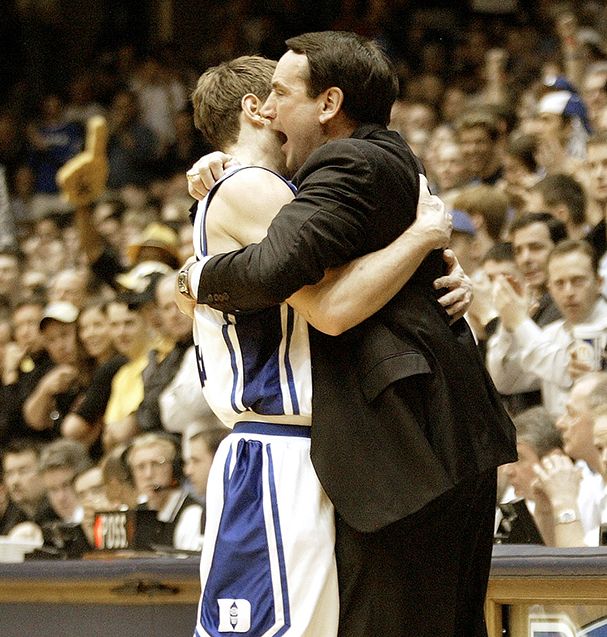
Coach K and the rest of the Duke basketball family have always embraced the job that Patrick Davidson did defending Chris Paul. Craig Jones/Getty Images
AFTER BEATING GONZAGA, the Blue Devils rose to No. 1. The top-ranked team in the country, they left on an early-evening flight from Raleigh into a cold Columbus, Ohio, on the next-to-last day of November. It was dark when they landed. The unranked Ohio State Buckeyes awaited. The Duke players were believing their hype, but the coaches weren’t. They worried this was a classic trap game, and they were right. On Nov. 30, Duke lost for the first time this season. Coach K looked at his players and demanded they learn from this feeling.
He’s lost 365 times in his career, each of them a small death, and there are four decades of his extreme reactions to them. You could pick any of them to get a sense of how his main coaching strategy seems to be setting himself on fire and hoping his team will be drawn to the light. Here’s one. In February 2005, as his team prepared to play Georgia Tech, Krzyzewski hit peak intensity. The night before the game, he played the team a battle scene from “Braveheart,” showing William Wallace lopping off heads and planting a sword in the ground. The following day, the team ran out for layups and then returned to the locker room. The Cameron crowd was booming. The assistants put on “Braveheart” again and as Wallace planted his sword, Krzyzewski came screaming into the room, waving his old Army saber. He planted his sword into a big planter of dirt an assistant had strategically placed.
“Let’s go, motherf—ers!” Krzyzewski yelled.
Nine minutes into the first half, during a timeout, Coach K screamed at the officials Daniel Ewing had been fouled. Then he just collapsed. Mickie ran to the bench. The trainers rushed to his side. It was incredibly tense. Then he got himself up, gave his stunned players more instructions and kept coaching the game.
Four days later the Blue Devils beat No. 2 North Carolina. Then came two straight losses, one at Maryland and the next a stunner at Virginia Tech. The spiraling team rode a bus back through the night toward Durham.
“I remember it being quiet,” says Patrick Davidson, a walk-on guard for that 2004-05 team.
They got back late, or early actually, maybe 3 in the morning, and Krzyzewski called the team into the locker room for one of his infamous meetings. These would last, former Duke guard JJ Redick remembers, basically until one of the players started to cry. They finally went home around 5 a.m. When they got back for practice later that same day, they saw the board with the starters listed for the next game against Wake Forest at home, a team led by phenom guard Chris Paul. There were four names listed to start against Wake: two walk-ons and two former walk-ons.
“I don’t know who the fifth starter is,” Krzyzewski told them.
His plan, he said, was to go up in the stands and just watch like he didn’t know a single thing about the team. The assistants trotted out every brutal drill they could imagine — “nothing to do with basketball,” Redick remembers — like throwing a ball on the court and making two guys fight for it. They did boxout rebounding competitions. Five wind sprints, make a layup, then dive on the floor.
Redick won every drill. He always loved doing the gladiator thing. Coach told the team Redick and the four scrubs would start against Wake.
The next day the team roared onto the court. For the first three minutes, Davidson, who remains an object of cult obsession in the Duke world, pressed and mugged Paul, picking up two fouls and getting in the star’s head. When Krzyzewski finally took Davidson out to replace him with Ewing, he wrapped his arms around the walk-on in a huge bear-hug. Duke won.
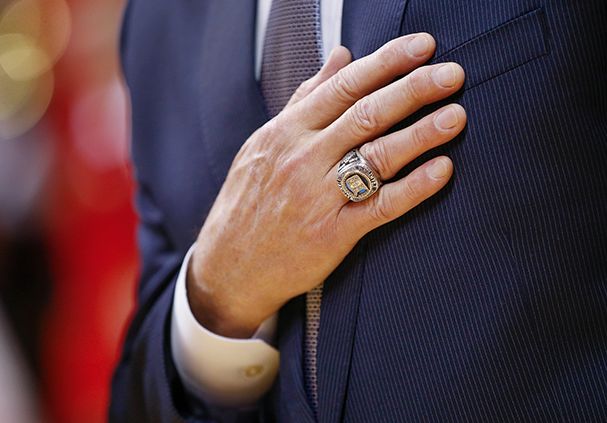
Coach K would like nothing more than to end his final season with a sixth national title, and he sensed something special in this squad from the start. “I feel closer to this team than I have in the last decade,” he says. Michael Hickey/Getty Images
Five years ago, in January 2017, Coach K missed a series of games after midseason back surgery, a run of six procedures in 15 months. The person he seemed to punish most of all in his pursuit of excellence was himself, although all Duke players can tell you punishment runs downhill. The way Krzyzewski pushes himself has scarred him, to be certain, but it has also taken its toll on everyone who reached for greatness with him. While he recovered from his back operation, Jeff Capel ran the squad. The team lost at home against NC State. All the players got a mass text: Go to Coach K’s house immediately. They walked in to find three rows of five chairs set up. He went down the line, player by player. He told star Jayson Tatum, who recently relayed this story on Redick’s podcast, that all he cared about was the NBA and he should just quit officially, since he’d already quit in spirit. The players left and then got another text: Be in the locker room at 6 a.m. They walked in to find two trash bags by every locker. The assistants told them to take everything out of their lockers. Tatum carried his two trash bags to his car. When they returned for afternoon practice, the security code on the locker room had been changed. The players walked to the court to find a pile of white shirts and blue shorts. They hadn’t earned Duke gear.
Redick shivered when Tatum finished his story, and then laughed.
“There’s some PTSD there,” he said. “This is bringing back all the memories.”
THE DAY BEFORE the Ohio State loss, Father Francis Rog died. He was 91. Coach K got the news and flew home a few days later for the funeral. Moe met him at the private airport and got concerned when his friend limped toward the terminal door.
“What’s going on?” Moe asked.
“Ankle,” Krzyzewski said.
He didn’t look as energetic as he had beneath Madison Square Garden. Although he’d been saying something different in public, truth was, he had put a lot of pressure on himself, more than usual, to finish this last run the right way, to wring every moment from an experience he’d never have again.
“I want it to be so good,” he says.
It was taking its toll on Coach K and his family.
“I think they’re tired,” Moe says.
Moe and Mike rode together to the service. They arrived long before it began. Krzyzewski greeted old friends and then walked to the open casket. A man saw him coming and moved to give him space and for 30 seconds Coach K stood there and didn’t move. He walked away, and then walked back to the casket with his sister-in-law, Pat, who was married to his brother. Bill was enormous, 6-foot-5 and a barrel of a man, who retired a captain in the fire department and died only a few years later. He and Pat never got to realize all those plans they made about the life they would live once the last fire had been fought.
“My brother was my hero,” Krzyzewski says.
He moved around the sanctuary and shook hands and gave hugs. His presence seemed to comfort people. Eventually the crowd took its seats beneath the beautiful white marble and stained glass dome of the Polish basilica. The service began with a solitary ringing bell. Krzyzewski sat on the left side and didn’t speak. He said goodbye to his friend and counselor, the man who’d given him permission to become Coach K. Now in this winter of his career, all sorts of questions were following him wherever he went, about who he’d be when this ended, when he wasn’t Coach K any longer but just a wealthy, famous, respected grandfather named Mike.
Father Rog had always bridged those two parts of him, and now he was gone.
Eight men escorted his body from the church while Krzyzewski watched in silence, standing with a dark overcoat folded over his arms.
BY DECEMBER IT WAS clear those flashes of greatness against Kentucky and Gonzaga were, in fact, flashes. Coach K’s last team would have to be shaped in real time, while playing real games, starting conference play just before Christmas. ACC games meant the arrival of what he calls “battle mode.”
“He really believes battle mode is one of the reasons they win,” Bilas says.
Battle mode is a way of looking at the world, of ordering it, stripping away everything that doesn’t directly impact the next game. Visitors to town know not to be offended if all he can talk about is the team. There are lots of other signs. He’ll stop sleeping. He’ll skip meals. He’ll start to look gray. He’ll find fuel wherever he can.
“What amazes me is, despite all his success, his ability to keep a chip on his shoulder,” Northwestern head coach Chris Collins, a former Duke player and assistant. “It’s amazing. The great ones have the ability to create their own adversity, their own enemies. We might have a mid-January game against Clemson. He’s coached 1,500 games, but he finds a way in those two days to get angry about something.”
Krzyzewski doesn’t know what he’ll do with this side of himself when the season ends. “I haven’t thought about that, but it’s interesting,” he says. “Part of having that keeps you young. Keeps you relevant. Keeps you purposeful. And so it will be interesting where I channel that. Because it’s got to be in something. If it goes, then you might as well say goodbye.”
The greatest enemy of battle mode is memory mode, and he stubbornly refused this season to engage in nostalgia. The team never heard him talk about his last dance. The truth is, he loves this spartan way of living and when his career is over, it might be what he misses the most. Mike Krzyzewski becomes Coach K in this ritualized world. Krzyzewski settled into long-ago defined patterns. Pizza (usually from a local place) waiting on the bus after every road game, which he eats in his usual seat, second row on the right side. When he walks onto a team plane, he doesn’t have to think: pass the players, who he has always put in first class, then to the left-side aisle seat in the first row of coach. It’s in these little rituals that memory mode lurked, and he started to consider the scarcity of the feeling he got walking onto the court at Cameron.
Coach K worked all ACC season with a furious joy. He rode his stationary bike, working up a full sweat, and watched film at the same time. The coaches gathered after every game to break it down together. For a 6 p.m. game, they’d usually be done at midnight. Now these film meetings happen at Cameron. For years they happened at Coach K’s house, where the assistants and Krzyzewski would order pizzas and watch tape all night. Several past assistants talk about throwing the morning paper on the porch as they left after sunrise. The pizzas were a vital part of the routine. Krzyzewski liked to put salt on his pizza and, before he had to monitor his health, there would always be a salt shaker on his seat in the bus after games, so he could doctor up those postgame pies. During this final season, two old Duke stalwarts, Quin Snyder and Wojciechowski, met up for lunch on the road. They both reached for the salt shaker at the same time and smiled.
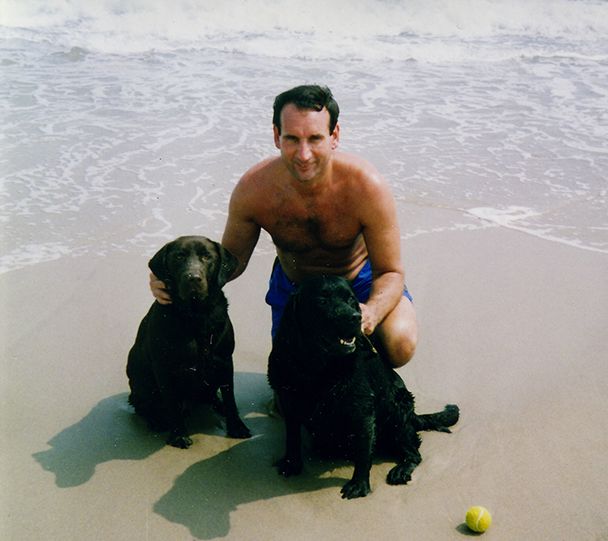
Dogs have always been a part of the Krzyzewski family, but the death of a beloved yellow lab named Blue was a cruel way to start Coach K’s season of farewells. Courtesy of Duke
FOR CHRISTMAS HIS FAMILY gave him a present to unwrap. Inside he saw they’d picked out a new Labrador; they made the deposit, and the puppy would be born at the end of March. Always loyal, he wanted to make sure his family knew he wouldn’t ever forget Blue, or think he could simply be swapped out for another dog.
“I’m not replacing Blue,” he said firmly.
They smiled and said they understood. This would be a beautiful new relationship, not an attempt to recreate an old one. Christmas is always a huge deal in the Krzyzewski family. Mike got Mickie a ton of pairs of pink Nike sneakers. Mickie always gets everyone matching pajamas, and this year they were black and white flannel pattern. There’s a photo of all smiles in front of a towering tree. The children and grandchildren all spend the night at their house, a big lock-in. This year Coach K scheduled practice during the family-only time.
“You’ve ruined so many Christmases!” Mickie scolded him.
She runs a tight ship. They call her the Queen Mother. Coach laughed and reminded her that this would be the last Christmas he’d ever ruin.
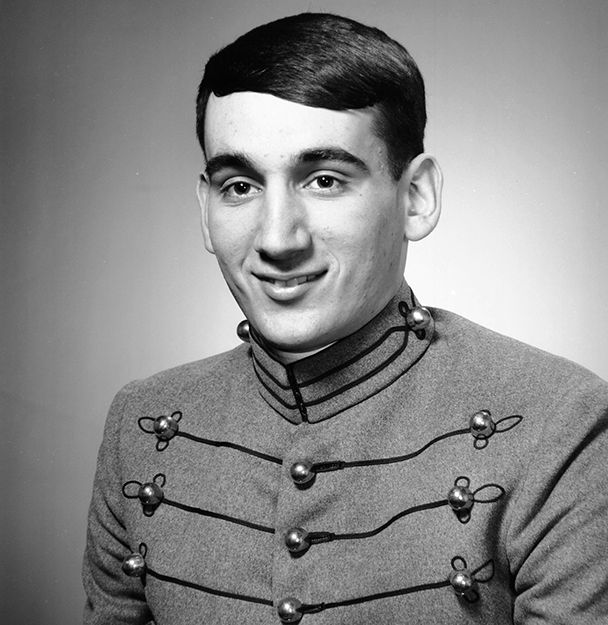
It’s been more than five decades since Mike Krzyzewski graduated from West Point, but the friendships that he forged remain strong today. Courtesy Army West Point Athletics
ON JAN. 16, in between a win versus NC State and a loss at Florida State, Coach K got the news that another of his West Point classmates had died, the first to pass during his final season. Bob Hoffman was a decorated war hero and a grandfather. Mike was in Bob’s wedding, one of the guys holding a saber — the same kind of saber he’d later use to fire up his team. Those long, gray line days were distant indeed. Just after Bob died, his widow, Lorie, was walking through their neighborhood in Idaho when her phone rang. A call from Durham, North Carolina.
Krzyzewski told her how sorry he was, and they laughed and remembered the old, good times. Each of them bragged on their grandchildren and talked about their families.
“You can tell how much that phone call meant to my mom,” Bob’s daughter Carina Van Pelt tells me. “My mom heard from every single person in that class, either a call or a nice long letter. It was pretty amazing how close they are.”
Even 53 years removed from graduation, West Point still matters to Krzyzewski, because of his friendships forged in the shadow of the daily Vietnam casualty reports, and because of the way his college coach and first coaching boss, Knight, shaped his life, in ways good and bad.
A young Mike Krzyzewski idolized Knight, even as part of him probably hated him, in that way that ambitious people sometimes can’t tell the difference. The basketball press made the comparison all the time until Coach K bristled at that, both wanting his mentor’s approval and wanting to be seen as his own man. As he started his climb in the sport, Knight loomed large in his mind, especially in the early 1980s. “You could almost see the wheels turning,” Bilas says. “What would Knight do?”
Knight rooted for Krzyzewski, wearing a Duke button on his shirt at the 1986 Final Four. But when Coach K won his first national title in 1991 and then beat Indiana in the 1992 Final Four, the relationship changed. Coach Knight did a limp drive-by handshake after the game, and when Krzyzewski waited in a hall for a second chance after the Hoosiers’ news conference, according to John Feinstein’s “A March to Madness,” Knight blew him off completely.
Then the letter happened.
It’s famous inside Duke basketball as a critical breaking point. After the game in ’92, Knight had a mutual friend from West Point deliver a blistering letter that Knight had written, threatening Krzyzewski with an end of their relationship, just venom pouring off the page, turning a perceived slight into a paranoid, angry screed. Knight had been into Krzyzewski’s family home for his father’s wake and now this? This fracture would grow and shrink in the coming years until finally the coaches simply stopped speaking, or rather Coach K gave up trying to be the bigger man. “I think that’s been a horrible chapter in his life,” Bilas says. “Knight should have been proud of him. He’s like a child whose father won’t acknowledge his success.”
After that 1992 win over Indiana, with a Michigan game looming in 48 hours for a second straight national championship, the Knight letter dominated the insular Duke ecosystem. Krzyzewski got back to his hotel suite in a fog, just totally devastated. Current Notre Dame head coach Brey, then an assistant, remembers how they were trying to work and Coach and his wife kept bringing up the letter, trying to make sense of their hurt. Finally Brey knew he needed to do something. He stood up and spoke simply.
“F— Bob Knight,” he said.
THE GAME AFTER Bob Hoffman died, Mike Krzyzewski took out one of his rosaries and said a prayer, dedicating that night’s contest to his friend. He does that every game he coaches. It’s his moment to be alone before the coming storm. On the road he’ll sit in his hotel room and at home, he steps into a private room in Cameron, just off the big space where he does his postgame news conferences. Once he gets settled, he’ll reach into his right pocket, where he keeps the rosary given to him by Father Rog, blessed by Pope John Paul II, and finds peace and perspective. In his other pocket he carries another rosary, the one that belonged to his mother. This season he dedicated several games to his mother and father and brother. Against Virginia, he dedicated it to Mickie’s family, because she grew up near Charlottesville. On his desk in his spartan downstairs office by the locker room, he keeps photographs of young kids he met over the years in hospitals who died, and a prayer card from one of his first players at Army. He carries these people with him, inside him. They are him. He is always communicating across planes of existence. This spiritual life, this desire to walk with spirits, is one of his greatest gifts and, when swirled together with his Polish tribal roots and his West Point education, lies at the heart of his success. He is, most of all, a collection of everyone he’s ever met. Every time you see him on television he’s got a rosary in each pocket, twin portals, a way of communicating with the people who walked this road with him but didn’t make it to the end. Who are being carried by him to the end.
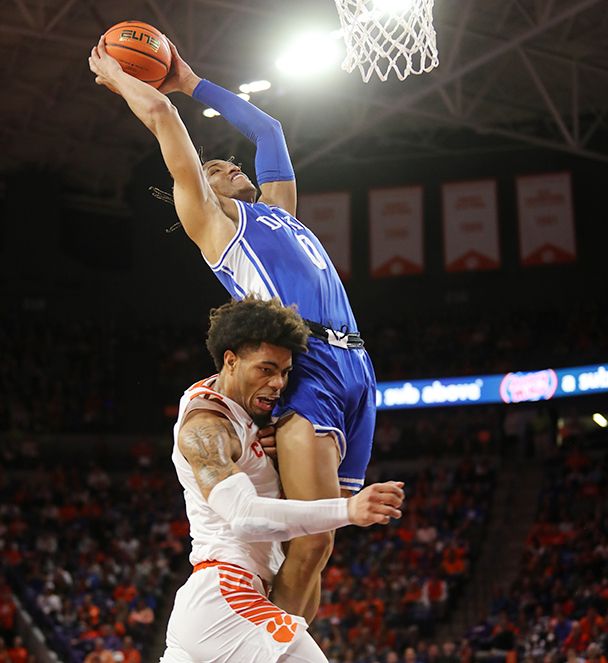
After all these years, Coach K is still willing to go to bat for his players. Exhibit A: His response when Wendell Moore Jr. was fouled by Clemson’s David Collins. Dawson Powers/USA TODAY Sports
JANUARY ENDED AND Coach K looked terrible. He always does this time of year. “That’s how you know it’s February,” Debbie K says with a laugh. “It’s Groundhog Day, it’s President’s Day, Valentine’s Day, Coach looks like s—. It must be February.”
Duke entered its toughest stretch of the season, four games in eight days, five in 12. Those became coded mantras — 4-in-8, 5-in-12 — and the whole program hunkered in battle mode, like a warship that sounds general quarters and turns on red lights. Duke won the first game against Carolina — folks inside the program bristled that the Tar Heels didn’t honor Krzyzewski during the game — and then turned around and lost to Virginia, a well-coached team that gives Duke fits. That was the fourth loss of the season, the last three by a total of four points. Three days later, Duke star Wendell Moore Jr. streaked toward the basket, Clemson guard David Collins undercut him and Moore came crashing down. He writhed on the floor, and Coach K wheeled around to the Clemson bench and screamed, “What the f— are you doing?”
He started moving toward the baseline. Debbie screamed in front of her television and realized her father, a 75-year-old man, was stalking off to fight a college kid on national television.
“My dad has very small lips,” she says, laughing. “When there are no lips, he’s seething. I haven’t seen him that mad in a very, very long time.”
Debbie is sitting in her dad’s conference room talking about the play, and how Coach K got himself under control, and how the Clemson coach did a masterful job defusing, until everyone hugged and the game continued. His mentor might have detonated his career in a moment of rage, but Coach K isn’t his mentor.
“You say this Bobby Knight thing …” Debbie K says. “This is where …”
“He’s coached 1,500 games, but he finds a way in those two days to get angry about something.”
– Chris Collins
Her voice fades, and she’s quiet. Her dad carries the scars of a relationship soured by pettiness and anger. But he also didn’t replicate Knight’s mistakes. One of the most poignant parts of this season has been the constant stream of former players coming to meet Coach, bringing family members and children, wanting to be part of the end. He has spent his final season surrounded by the relationships he built over five decades, relationships that remain intact in no small part because he saw firsthand how not to treat someone. There have been rifts along the way, but the relationships always seemed to win out in the end. The people close to Krzyzewski understand that Knight’s worst impulses live in Coach K but he has managed to control them.
When I ask him about Knight, he sighs and says, “It’s complicated.”
Then he talks immediately about working to be a better person.
“I don’t know when but in the last decade, I said, I am not gonna have hate or resentment be part of what I do,” he says. “My mom would say that all the time. She would say, ‘Why let that in your heart?'”
He learned how to let go of hate and resentment. He learned by example. He learned by practice, by teaching. Knight once imagined he’d be carved in stone, on the mountaintop of his sport, and now he’s the fifth-winningest coach who destroyed everything he built. His biggest contribution to basketball might be showing Mike Krzyzewski how not to treat people, which has allowed Coach K to emerge from this brutal grind of 47 seasons with his life and friendships and family intact.
Debbie K grins.
She knows she shouldn’t say it, but … what the hell.
“Karma,” she blurts.
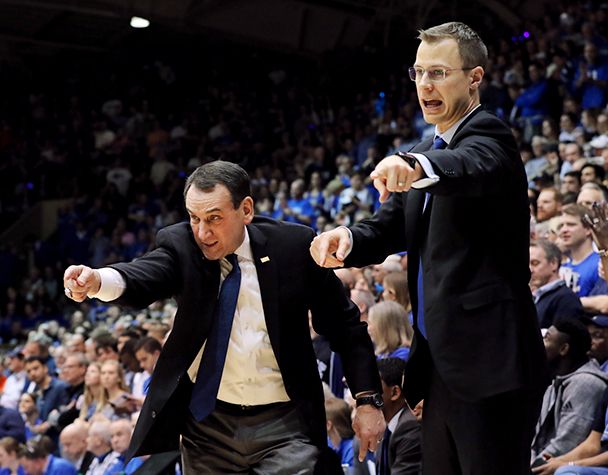
Jon Scheyer won a national championship playing for Mike Krzyzewski in 2010, joined his coaching staff in 2013, and never left. Jaylynn Nash/Icon Sportswire/Getty Images
EVERY MORNING MICKIE KRZYZEWSKI sends out that day’s basketball schedule. It starts on a family text chain called “Basketball Freaks” but gets forwarded around the Duke basketball world. (This thread is not to be confused with “Starting Five,” the group chat of Coach K, Mickie and their three girls). In Basketball Freaks, she has carefully listed all the college games they might care about, along with the time and the channel, sorted by ACC, Ranked and Other.
JohnnyDawkins v Houston 9:00 209
Ore v BobbyHurley 9:00 206
ChrisCollins v Minn 4:00 610
This happens every day, tracking Amaker’s Harvard or Nate James’ Austin Peay or Jeff Capel’s Pitt Panthers (aka The Fighting Capels), and folks look forward to their daily updates. The Duke basketball office is, and always has been, a blend of Coach K, his team and his family. When the three Krzyzewski girls were young, they had crushes on dad’s players and now some of their own girls babysit for the assistant coaches. Snyder lounging around the house as a student watching college football has given way to Mark Williams and Jaylen Blakes learning how to play bocce ball in the backyard. The one time Debbie got busted drinking in high school, part of her punishment was her parents telling the team. She remembers Danny Ferry running into her and her mom and dad at a Duke football game and cracking, “Hey, Deb, wanna go get a few beers?” The lives of all these people are so intertwined that it’s difficult to tell where family ends and the team begins.
“I view him as a second father,” Collins says.
His players became part of his life. They hung out with his mom. They knew his brother. Amaker remembers a tour of West Point that Coach took him on when they were in New York recruiting. Brey remembers all those trips through Chicago, where they’d finish work and roll through the Polish neighborhood and find something to eat.
Every former player I called had stories about hearing from him when something went good or bad in their life. Collins tells me about a tough loss he suffered early in his time at Northwestern against Maryland. They’d been up 11 with four minutes to go and lost at the buzzer. The team got on a plane and flew to Chicago, and around 1:30 a.m., as he’s driving home, his phone rings. It was Coach K, “just talking me off the ledge.”
Arizona State coach Hurley says he struggles even now to treat Krzyzewski like a peer because he reveres him so much. Only two people in his phone have their numbers saved with just a single letter. His wife, Leslie, is programmed as L, and Coach is simply K. After Hurley was almost killed in a car wreck during his rookie season in the NBA, and he finally started to drift back into reality, around the second day, he found his parents and Coach K leaning over his bed. Same thing happened years later when Jay Williams almost died in a motorcycle crash. Krzyzewski was in the air in a private plane when he got the news. Moe says he made the pilots turn the plane toward Chicago. From the air, Krzyzewski called Moe and asked if he could pick him up at the airport. Moe drove them to the hospital and stayed in the car while the coach rushed inside. He got there in time to be one of the first faces Williams saw when he woke up. When Coach K got back in the car, he turned to his oldest friend with tears in his eyes and said, “Moe, it’s pretty bad.”
His greatest gift has always been not only his ability to create deep relationships, lifelong relationships, but his need for them. He loves and is loved back in return, existing at the center of a huge spinning wheel, of players, and coaches, at Duke and on the Olympic teams, his family both in Durham and Chicago. So it’s important to know that this last season, although hard, has been a happy time, with Formers returning and bringing their children back with them. One Sunday, Krzyzewski came into his office, visited the guys in the training room and then went to watch film. Debbie texted and told him to look in the gym. They’ve got a closed-circuit camera in Cameron that he can always access. When he turned on the feed, he saw two of his assistant coaches with their kids, and two former players with their kids, everyone having a great time.
“It looks like a daycare center,” he says beaming.
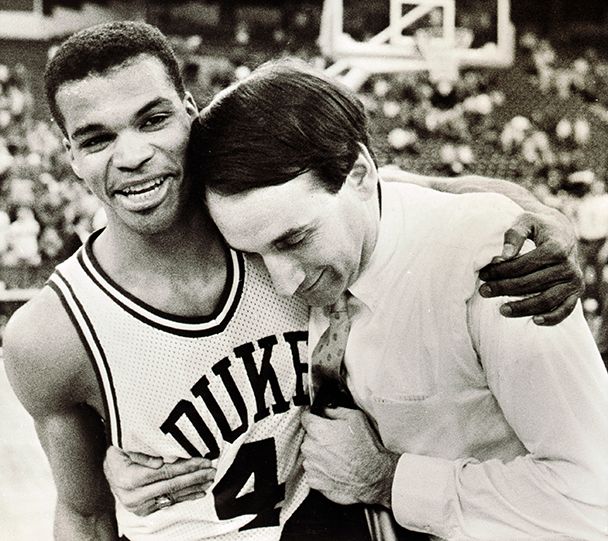
Tommy Amaker was a member of Mike Krzyzewski’s staff for two national championships at Duke before leaving for Seton Hall, Michigan and then Harvard. Courtesy Duke
COACH K TURNED 75 during that brutal run of games, and he celebrated by going into the office on a Sunday. He’s been sleeping four or five hours a night, battle mode forever. “He looks horrible,” Bilas says. “He’s burning the candle at both ends. He’s overworking himself. He’s watching film all night, doing stuff he did when he was 40.”
The last game of 5-in-12 landed on the following Tuesday, at home against Wake Forest, the same day excerpts from Ian O’Connor’s long-anticipated biography, “Coach K,” dropped. O’Connor, a respected columnist for the New York Post, interviewed more than 275 people over two years, and news stories started circulating online. The juiciest one said Coach K had hijacked the search for his replacement and kept Amaker from getting the job, with the goal of maintaining control of the program.
Krzyzewski started to spiral.
“He didn’t feel good all day because he was really upset,” Debbie K says. “He talks things out. He thinks out loud.”
She sat with him and talked about Amaker.
The situation is more nuanced than the headlines. Krzyzewski calls the claim “a cheap shot,” and the belief around Coach K is that the source quoted in the book overstated the coach’s desire for control once he’s gone. Amaker and Duke declined to comment on this subject. An anonymous person told O’Connor that Krzyzewski could be “Don Corleone” when he felt it necessary, and a source close to both Coach K and Amaker described O’Connor’s reporting to me as accurate. What’s clear from this private dispute being made public is that the succession plan left some damaged feelings. On the day the story became public, Krzyzewski worried that he’d hurt a member of the tribe. “He 100 percent has that guilt,” Debbie K says. “‘Did I do something that caused any harm that would bother Tommy? I love Tommy. He’s one of my boys. I don’t ever want anything to hurt my guys.'”
Sitting in his office, emotional and raw, he looked at his daughter.
“I just want to take care of everybody,” he said.
“You have and you are, Dad,” she told him.
She understood, too, the unspoken part of his emotional reaction, coming days after he turned 75, with just two games left to coach at Cameron.
“Even when you are not on the sideline,” she told him, “you will still be taking care of these people. They’re still your boys.”
That night, Krzyzewski led his team onto the court to play the Demon Deacons. Debbie and Mickie watched from upstairs during the first half until Debbie saw her daughter frantically waving her cell phone at her, as if to say: Check your texts. Debbie saw a message: Poppy doesn’t feel good.
Debbie slipped away from her mother, not wanting to worry her yet, and went down behind the bench to talk to the trainers. They told her they wanted to wait for the media timeout at under eight minutes to get him some Gatorade. Everyone agreed to meet in the locker room at halftime. Mickie Krzyzewski had seen all of this commotion and when Debbie returned upstairs, Mickie asked what was going on. Debbie explained that he felt lightheaded.
“I’m going,” Mickie said.
At halftime Krzyzewski struggled to keep his eyes open. His blood pressure was elevated. Doctors gave him fluids through an IV. When he recovered enough to watch the game, he started yelling about the officials and his blood pressure rose again. His daughter Jamie scolded him. “Dad, are you kidding me?” she said, according to her sister. “Really? This is what we’re doing? You’re gonna stroke out in the middle of a f—ing basketball game?”
He raged at himself, too, at time, at being 75, at losing some essential part of his K-ness.
“I sound like I’m weak!” he barked.
“You don’t sound weak,” Debbie told him. “You sound human.”
The team won, barely, and the beat reporters searched for news about Krzyzewski’s health. He spoke to his players briefly and then went home without breaking down the film, a tiny concession.
Later that night, Debbie texted with her mom.
“Where is he?” she asked.
“He’s rewatching the game,” Mickie replied, “but I convinced him to watch it from bed.”
THE NEXT AFTERNOON, Debbie met me in the conference room next to her dad’s office. She told me he felt a lot better and that he and Amaker had talked, which helped. They are all feeling emotional. Krzyzewski remains in the moment, but these people who love him are wondering about the end of the season.
“We have to be strategic,” Debbie K says. “When people retire they age very quickly. He’s been so ageless for such a long time. We have to make sure he stays active, stays in it, because otherwise what are you gonna do? You’re gonna be a really old, crotchety, grouchy person.”
There are a few things on the calendar. This team will officially disband after the April 14 team banquet, and then the annual K Academy will happen in early June, which brings back a legion of Formers, so that will feel like a reunion. They have their annual family summer vacation planned, where all the kids and grandkids stay in a rented house. A chef comes every night to make dinner, and the whole family plays marathon sessions of board games.
This year they’ll be at a lake house in North Carolina that comes with a boat, a hot tub and, most critically, a bocce court. At the lake, Krzyzewski will team with a younger grandkid and take on all comers, winner stays. “He talks enormous amounts of trash on the bocce ball court,” Debbie says laughing.
He likes Vegas. He likes really nice wine, mostly heavy Californian reds and a few nice Italians. All 10 of his grandkids live in Durham and three live within a mile of his home. The Krzyzewskis have a pool and games and love the energy of a house full of family.
“My wife has created a grandkids trap,” Krzyzewski says with a smile.
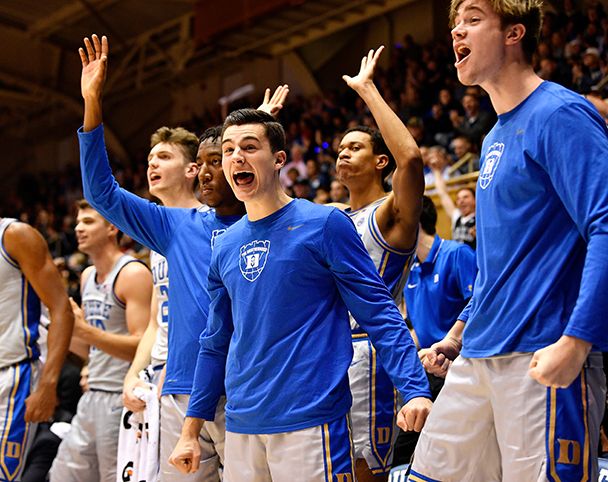
Michael Savarino is one of 10 Mike Krzyzewski grandchildren, but he’s the only one who calls him “Coach.” Grant Halverson/Getty Images
Krzyzewski told his granddaughters he wants to take them to Chicago once this is all over, and show them all the places he once knew. They’ve never been with him. There is also a planned West Point trip to do the same thing, to slip warmly into the memory years.
He is keeping his office on the sixth floor, doing work as an ambassador for Duke, but the floor beneath him is being completely gutted and rebuilt. Part of the renovation includes literally bricking up the back stairwell leading from his office to the nerve center of Duke basketball.
Krzyzewski has said over and over to friends that he won’t be like John Wooden, going to all the UCLA games and casting a long shadow on the man with the difficult job of replacing him. His daughter says that you can hear the Cameron crowd up on the sixth floor, so he can’t be in the office for games, either. There will be corporate boards, and maybe a role with the NBA, and family trips and youth sporting events and fundraisers. But there won’t ever be another team.
“What are you gonna do without the outlet?” his daughter asks.
His family insists he isn’t saying goodbye to Duke, or to basketball, just to being the head coach of a team, but there are things he’ll never have again. He is saying goodbye to battle mode. He is saying goodbye to the annual rebirth of new relationships. There are no more ambitious 18-year-olds coming to be baptized into the tribe. Mike Krzyzewski has a lot more to do in his life. Coach K will start to fade the moment this season ends. Maybe that’s a good thing. He’s earned peace. Redick says people ask him constantly how Krzyzewski will handle retiring. He always gives the same answer about the satisfaction of walking away justified and intact.
“I’m f—ing happy for him,” he says. “He doesn’t even know what’s on the other side. It’s so good. What he’s about to experience is so good.”
TWO MORNINGS AFTER almost collapsing on his sideline, an embarrassed Coach K came into his office wearing a blue Duke pullover with every black hair perfectly in place.
“I’m doing better,” he tells me, “but I’m not there yet. That s— I got was f—ing exhaustion. It was a culmination of all that travel. We’ve had so many one-day turnarounds, and I still prepare the same way.”
He sounds open and vulnerable.
“I’m 75,” he says.
He pulls out a pair of socks and puts them on the table. Laughing, he says when he got into his office after the medical scare, he found a bag stuffed with Polish-themed wrapping paper with a gift inside: Duke-colored socks with Moe’s face printed on them.
“Moe is as good a friend as anyone has ever had,” Krzyzewski says.
“He doesn’t even know what’s on the other side. It’s so good. What he’s about to experience is so good.”
– JJ Redick
He slips on a set of headphones and looks at the notes spread out on the table. It’s time for his weekly SiriusXM radio show, which he has done for 17 years. He loves talking to people inside and outside of sports, and the show allows him to briefly show the world what people inside the program have always known: Coach K is actually hilarious. Today’s guests are the CEO of McDonald’s and Georgia football coach Kirby Smart. He sounds wistful talking to Smart, wishing he could experience the feeling of a first national championship again. Krzyzewski talks eloquently about how he loved watching Smart share the title with his players, coaches, fans and family. Coach K will miss that brotherhood. His daughter has loved to slip into the practice gym this season and just watch him coach, working with individual players or sitting down to talk to a recruit. He is not somebody who is limping to the finish, or who is cheating himself, or the game. Krzyzewski is going to coach his last team with all of himself until the last whistle blows. You can hear it in how he talks to Smart, picking his brain about coaching tricks to make hard practice tasks fun for the players. On the eve of his next-to-last home game at Duke, Coach K is still trying to get better.
“I wish we had a lot more time,” Krzyzewski tells Smart.
Two nights later, with Cameron as loud and intimidating as ever, he walked slowly onto the court and allowed himself to take in the feeling, to let himself plug into the energy. He felt lucky and grateful. The bleachers behind his bench were filled with Moe and a huge group from the old neighborhood. A few hours before, Krzyzewski had reached into his right pocket, pulled out his rosary and dedicated the coming action to all the dead Columbos and to Father Rog. He said their names. They were with him.
Following the game, after a season of swatting away any question about nostalgia, he finally indulges the idea and admits what everyone already knows: It will be incredibly emotional when Carolina comes to town and he leads a team for the last time onto the court that bears his name. The past was everywhere around him now. The next morning, he and Moe and the old neighborhood friends went to early-morning mass. Usually Krzyzewski slips out after communion, but his friends didn’t know the drill and returned to their seats, which meant he stayed around at the back of the sanctuary until the service ended. When the priest asked if there were any visitors, Moe stood up. Coach K shook his head as Moe announced he and these guys were from Chicago and then started speaking to the priest in Polish.
For a moment they were on Cortez Street again, and all of this was yet to unfold.
MIKE KRZYZEWSKI DIDN’T WALK into his office so much as he floated, carried along on waves of optimism and focus. It was about 9 a.m., less than a week ago, and he was operating on four hours’ sleep; the team had arrived back at Cameron from a road win at Virginia around 1 a.m., and he’d watched film until 3:30 a.m. He couldn’t wait to tell me that he’d finally seen it: that mythical it that all great coaches know, even when it exists in a place beyond language — he had a team that was capable of going all the way.
He lounges in blue Duke sweats that say “brotherhood” on the pants and looks out his window at the sea of tents stretching out from Cameron, the students camping to see his last home game in person.
He tells me the story of the four days since I’d seen him last.
Two days after beating Florida State, with a well-coached, dangerous Virginia team on deck, Krzyzewski and his staff put his young team through a high-level preparation. And instead of flying over the players’ heads, it stuck. He told the team it had been in the shallow end all season and it was time to jump into the deep water. During Tuesday practice, Krzyzewski couldn’t believe what he saw. He felt things he hadn’t felt in years.
“I get chills thinking about it,” he says.
After that practice he gathered his team and staff and told them he’d seen something from them for the first time: They were ready for the coming battles of March … and even April.
“You’re an old Duke team right now,” he told them. “You look like a machine.”
Sitting in his office, he looks at me.
“They knew it,” he says. “I could see it in their eyes.”
He tells me about the trip. They all flew to Charlottesville. Mickie flew with him. He packed his rosaries. Managers sorted gear. They set up base camp like they’d done for nearly half a century, a Duke blue garrison, a world where he aged more each year while the faces he saw stayed young, Johnny Dawkins becomes Bobby Hurley becomes JJ Redick becomes Tyus Jones becomes Paolo Banchero. So many years had gone rushing past but also no time at all. Life was simple and sharp. They were in town to win a basketball game. They were brothers in arms. He gathered the team that night at the hotel and looked out at them. They looked back at him.
“You’re ready,” he said.
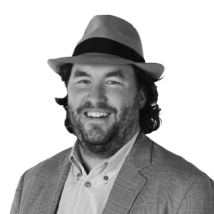
Wright Thompson is a senior writer for ESPN.
Illustration by ESPN. Photography by AP Photo, Getty Images, Imagn, Courtesy Duke.
